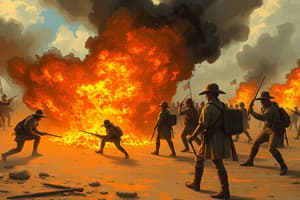Podcast
Questions and Answers
Why did America go to war with Spain in the Spanish American War?
Why did America go to war with Spain in the Spanish American War?
The war was caused to sell newspapers by Randolph Hurst, who claimed the Spanish were raping women and children. The explosion of the U.S. Maine and subsequent media frenzy led to public support for war.
What events led to direct American involvement in the Spanish American War?
What events led to direct American involvement in the Spanish American War?
The sinking of the US battleship Maine in Cuba's Havana Harbor was the official cause for American involvement.
What were the major battles of the Spanish American War?
What were the major battles of the Spanish American War?
Major battles included the battle at Manila Bay, U.S. troops landing in Cuba, the Battle of San Juan Heights, and the destruction of the Spanish fleet off Santiago Bay.
What impact did the Spanish American War have on America, Cuba, and the Philippines?
What impact did the Spanish American War have on America, Cuba, and the Philippines?
Signup and view all the answers
What was Progressivism?
What was Progressivism?
Signup and view all the answers
Describe a few of the various forms of the Progressive movement.
Describe a few of the various forms of the Progressive movement.
Signup and view all the answers
How did World War I begin?
How did World War I begin?
Signup and view all the answers
What events led to American involvement in WWI?
What events led to American involvement in WWI?
Signup and view all the answers
Study Notes
Spanish-American War
- The war was sparked by sensationalist newspaper reporting, notably by Randolph Hearst, who accused Spain of atrocities in Cuba.
- The explosion of the USS Maine in Havana Harbor served as the official catalyst for war, despite a later investigation suggesting an external explosion.
- Major battles included:
- April 25, 1898: U.S. Congress declares war on Spain.
- May 1, 1898: Commodore Dewey defeats the Spanish fleet in Manila Bay.
- June 22, 1898: U.S. troops land in Cuba.
- July 1, 1898: Victory at the Battle of San Juan Heights.
- July 3, 1898: Destruction of the Spanish Fleet at Santiago Bay.
- July 17, 1898: Spanish surrender at Santiago.
- August 12, 1898: Protocol of Peace signed, ending hostilities.
- December 10, 1898: Treaty of Paris signed, U.S. acquires Cuba, Puerto Rico, Guam, and the Philippines.
Impact of the Spanish-American War
- The war resulted in the U.S. control over Guam, Puerto Rico, and the Philippines, while Cuba remained independent.
- The Platt Amendment established U.S. intervention rights in Cuba, leading to the establishment of Guantanamo Bay.
- Theodore Roosevelt gained fame as a war hero through his leadership of the Rough Riders, paving his way to the presidency.
Progressivism
- Spanned from 1890 to 1920, characterized by social activism and political reform, primarily aimed at eliminating government corruption.
- Key themes of the Progressive movement included:
- Advocacy for Prohibition to undermine political power of local saloon bosses.
- Promotion of women’s suffrage for a "purer" electoral influence.
- Efficiency Movement focused on modernizing outdated practices across various sectors.
Causes of World War I
- The assassination of Archduke Franz Ferdinand on June 28, 1914, sparked a series of events leading to the war.
- The assassination was carried out by the Serbian nationalist group, the Black Hand, which incited a chain reaction of alliances and conflicts.
Events Leading to American Involvement in WWI
- Growing anti-German sentiment in the U.S. due to reports of German atrocities in Belgium and the sinking of the RMS Lusitania in 1915.
- The Zimmermann Telegram incited public outrage, as it revealed Germany's attempt to ally with Mexico against the U.S.
- On April 6, 1917, President Wilson urged Congress to declare war on Germany to create "a world safe for democracy," followed by a declaration of war on the Austro-Hungarian Empire on December 7, 1917.
Studying That Suits You
Use AI to generate personalized quizzes and flashcards to suit your learning preferences.
Description
Prepare for your History 2 Exam 2 with these flashcards focusing on the Spanish American War. Explore the reasons behind America's involvement in the conflict, including the influence of media and key events that escalated tensions. This resource will help you grasp essential concepts and prepare effectively for essay questions.




